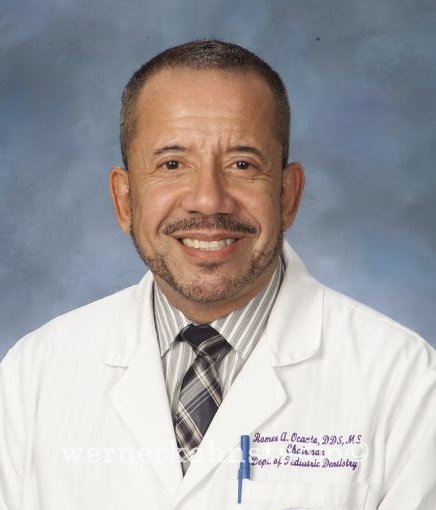
According to the Centers for Disease Control and Prevention, one in every 68 children in the United States has been diagnosed with autism spectrum disorder (ASD). Treating these children, who often have difficulties with communication and in processing unusual sensory stimuli, can be challenging.
Dentists and other personnel could benefit from special training to understand the skills and techniques required to more successfully treat patients with ASD. With this in mind, the Department of Health and Human Services Health Resources and Services Administration (HRSA) has awarded a 5-year, $3.4 million grant to the Nova Southeastern University (NSU) College of Dental Medicine.
 |
|
Romer Ocanto, DDS, MS, CAGS, and chair of the department of pediatric dentistry at Nova Southeastern University’s College of Dental Medicine, will use a $3.4 million grant to develop a curriculum to train dentists and other personnel to better care for children and adolescents with autism. |
Led by Romer Ocanto, DDS, MS, CAGS, chair of NSU’s department of pediatric dentistry, the program will develop a curriculum that addresses the transition of children and adolescents with ASD in dental care. It also aims to increase access to dental care for children and adolescents with ASD and other special healthcare needs. Dr. Ocanto described the program in a recent Q&A.
Q: The grant will be used to develop a curriculum. How do you see that curriculum structured?
A: The curriculum will be implemented starting in year one of the pediatric dentistry training. The new curriculum builds upon curricula already developed under previous awards with both individual courses and courses added to existing ones. The didactic component includes the participation of faculty members from NSU’s College of Dental Medicine and NSU’s Mailman Segal Center for Human Development (MSCHD) in addition to faculty from the Family Practice at Broward Health Medical Center. The difference this time will be that pediatric dentistry residents will be learning and interacting with advanced education in general dentistry (AEGD) residents. This will also apply to the clinical component of the curriculum, which will take place in NSU’s pediatric and adult dental clinics where patients with ASD are currently treated and under faculty supervision from both the department and the close participation of a behavior analysis from MSCHD.
Q: How will the new curriculum compare to the current training NSU offers?
A: The difference is the collaboration of different disciplines in the training of both pediatric dentistry and AEGD residents, both in the classroom and clinical settings, with AEGD residents learning how to treat children with ASD and pediatric dentistry residents receiving training on the treatment of teenagers with ASD transitioning into adulthood. Pediatric dentistry and AEGD residents will meet their educational objectives via 3 mechanisms:
• Didactic lectures drawn from an oral health curriculum on children with special healthcare needs;
• Rotation to MSCHD dental operatories including South Florida Autism Charter School, the NSU College of Dental Medicine Pediatric Special Needs Dental Clinic at Joe DiMaggio Children’s Hospital, NSU Dental Care at KID, Broward Health Medical Center, and NSU College of Dental Medicine’s special needs clinic in North Miami Beach and exposure to children, adolescents, and adults with special healthcare needs;
• And, didactic lectures drawn from an interprofessional primary care curriculum on children, adolescents, and adults with special healthcare needs.
Q: Do you have any feedback from students who may have enrolled in the training so far, or from students who are expected to enroll?
A: Currently enrolled residents have great expectations about the program because they are aware of the very positive feedback previous residents and graduates have provided and the fact that they continue using behavioral analysis to increase access to care and successfully treat children with special healthcare needs in their practices.
Q: What kind of feedback have you gotten from the families of patients who may have been involved in the training?
A: During the last 5 years, we have collected data on parents’ satisfaction. The results demonstrate nearly 100% satisfaction with the program, the treatment their children have received, the level of professionalism of faculty and residents, and the impact the training has had on children with ASD accepting dental treatment. A couple of manuscripts have been submitted for publication on results of surveys conducted among parents and residents.
Q. Once the period covered by the grant has ended, what do you envision as the next step of the program?
A: The next step is the sustainability of the program and expanding the training to pre-doctoral dental students and faculty members supervising the treatment of patients of all ages with special healthcare needs. From the perspectives of NSU’s MSCHD, past HRSA-funded residency training programs similar to this resulted in improved access to oral healthcare, reduced patient wait times, and increased care delivery. Should this initiative replicate those findings, NSU’s MSCHD would seek out continued support to sustain the integration of an oral health program within their settings.
Related Articles
Understanding Patients with Autism Spectrum Disorder
Dental Visits May Soon Be Easier for Children with Autism
New Educational Resources Address Oral Health Challenges for Children with Special Needs











